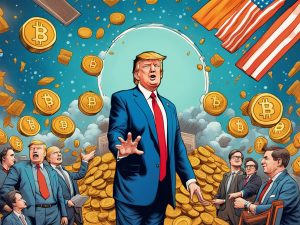President Trump’s Pardon for Ross Ulbricht: A Historic Decision 🎉
This year has witnessed a significant event in the cryptocurrency and political realm, as President Donald Trump granted a “full and unconditional” pardon to Ross Ulbricht, the individual behind the infamous Silk Road marketplace. This action comes as a culmination of a lengthy legal saga that has captured public attention and divided opinions on justice, liberty, and the nature of crime in the digital age.
Details of the Pardon 📝
On a notable Tuesday, President Trump took the decisive step to commute Ulbricht’s life sentences. The pardon erases two life sentences plus an additional 40 years that Ulbricht was facing for his involvement with Silk Road, which primarily served as a platform for the trade of illegal narcotics and other contraband goods, primarily using Bitcoin as the medium of exchange.
Trump personally reached out to Ulbricht’s mother to convey the news of his decision. The President stated, “In honor of her and the Libertarian Movement, which supported me so strongly, it was my pleasure to have just signed a full and unconditional pardon of her son, Ross.” Such a personal gesture showcases Trump’s engagement with the Libertarian ideals that have gained traction among many supporters.
Public Reactions 📢
The announcement generated considerable excitement within the community advocating for Ulbricht’s release. Supporters of the “Free Ross” movement celebrated on various platforms, expressing gratitude for the pardon. Their messages reflected a mix of relief and joy, identifying Trump as a person of his word who fulfilled a promise to stand by Ulbricht amidst intense debate over his lengthy imprisonment.
- The campaign’s social media account stated:
- “Words cannot express how grateful we are. President Trump is a man of his word and he just saved Ross’s life. ROSS IS A FREE MAN!!!!!”
This level of fervor indicates the strong emotions that Ulbricht’s case continues to evoke, particularly among those who advocate for criminal justice reform and a reevaluation of how society punishes non-violent offenders.
Understanding Ross Ulbricht’s Case 🔍
Ross Ulbricht, who marked his 40th birthday in March of this year, was convicted in 2015 on seven charges related to his administration of Silk Road. The platform gained notoriety for enabling illicit transactions, which, according to U.S. prosecutors, amounted to over 1.5 million exchanges valued collectively at around $213 million.
Ulbricht’s legal troubles began when he was arrested in 2013 after acknowledging that he was the creator of Silk Road. His trial and subsequent sentencing have sparked substantial discourse about the intersection of technology, law, and governmental power over individual liberties.
Trump’s Promises Relating to Crypto 💻
President Trump had previously voiced his support for Ulbricht during his campaign at the Libertarian National Convention in 2024. Following his recent electoral victory, Ulbricht expressed optimism about his future. He articulated trust in Trump to fulfill his commitment to seeking freedom for him. He noted, “After 11+ years in darkness, I can finally see the light of freedom at the end of the tunnel.” This sentiment typifies the hope shared by many of Ulbricht’s advocates.
Trump’s administration has indicated several initiatives regarding cryptocurrency, which include the establishment of a strategic stockpile of Bitcoin, forming a Crypto Presidential Advisory Council, and addressing current regulatory frameworks to favor the burgeoning industry. These promises reflect a broader vision to position the United States as a leader in the cryptocurrency and blockchain spheres.
Hot Take: A Transformative Moment for Cryptocurrency and Justice ⚖️
The recent pardon of Ross Ulbricht by President Trump could represent a transformative moment for both the cryptocurrency landscape and discussions surrounding justice reform. The implications of this decision extend beyond Ulbricht’s immediate situation, providing a platform to explore the ethical and legal questions surrounding digital marketplaces.
As advocates for reform and supporters of individual freedoms continue to weigh in, this year’s pardon signifies a pivotal juncture, prompting deeper conversations about the future of cryptocurrency, personal liberties, and the societal perception of criminal justice in the context of technological evolution.
Only time will tell how this precedent may shape policies and attitudes within both the cryptocurrency community and the larger context of law and justice.




 By
By

 By
By
 By
By
 By
By